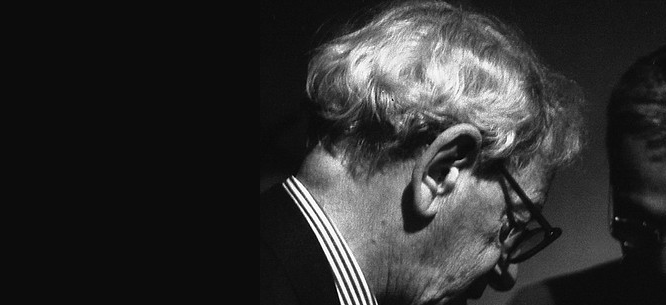Eric Hobsbawm and the Limits of Marxism
Eric Hobsbawm and the Limits of Marxism
While Hobsbawm will be remembered as a historian of singular gifts, his writings already seem less a harbinger of the shape of things to come than sterling examples of an older kind of scholarship at its best.

Eric Hobsbawm was one of the greatest historians produced by the twentieth century. Easily. You could slice off any five of the books from his C.V. and he would still be in the running. A thinker of dazzling scope and dizzying erudition, Hobsbawm had few peers and many emulators. He specialized in the nineteenth century but remains a giant in scholarly debates ranging from the seventeenth century to the twentieth. Historians at their most ambitious, he believed, could aspire to explaining “how and why Homo sapiens got from the paleolithic to the nuclear era.” Nobody can claim with even a tattered shred of intellectual honesty the competence to fulfill this project, but Hobsbawm came as close to meeting the challenge as any of us Homo sapiens is likely to.
No surprise, then, that his death has precipitated a torrent of deserved tributes, from admirers on the cartoonish Right to comrades on the Left, with stops at seemingly every position in between. Celebrations of his intellectual achievements vie with accounts of personal kindness for the admiration of readers. But the rush to memorialize, though understandable, is a poor commemoration for someone whose work at its best was defined by skepticism of dogma and repudiation of sentimentality.
While Hobsbawm will be remembered as a historian of singular gifts, his writings already seem less a harbinger of the shape of things to come than sterling examples of an older kind of scholarship at its best. The distorting effects of his Communist partisanship have already received much commentary, but less remarked upon is the larger intellectual framework that guided his thinking—a framework that made the kind of sweeping histories Hobsbawm called for possible while exacting considerable analytic costs.
He was the last, and perhaps the greatest, of the British Marxist historians, a group clustered around the Communist Party Historian’s Group in the aftermath of the Second World War that included E.P. Thompson, Rodney Hilton, Christopher Hill, and Maurice Dobb in its ranks. They shared a commitment to building on the still feeble Marxist intellectual culture—especially in the English-speaking world—of the period while retaining its central theoretical commitments. Even in this crowd, Hobsbawm was notable for his commitment to a vision of history as the working out of grand processes and tectonic forces over centuries, or millennia. The rise of capitalism provided the master narrative, a unifying system that gave structure and logic to history. The British Marxists inspired some of the best of a generation of historians that came of age in the 1960s and 1970s, a cohort that dedicated countless dissertations to filling out small pieces of the story Hobsbawm and his allies had sketched with the hope that a synthesis would emerge—so many dots eventually revealing a glorious portrait.
Reflecting on the more recent career of his profession in 2010, Hobsbawm lamented that “the big transformative questions have generally been forgotten,” displaced by “fanzine history, which groups write in order to feel better about themselves.” “The classical example,” he continued, “is that of the Native Americans who refused to believe that their ancestors had migrated from Asia.” It’s an unfortunate remark, not just because of its uncharitable (or, less politely, ridiculous) evaluation of fellow scholars—and Native Americans, for that matter—but also, and more importantly, because of the blindspots it reveals in his worldview.
It’s easy, and correct, to thump him for the omission of race, gender, sexuality, and all the other keywords that spring so readily to the mind of anyone who has skimmed an academic journal or taken a class in the humanities since the 1970s. Just as damaging, however, is the assumption that there is an objective economic and social base that is being slighted. Near the end of How to Change the World, the last book Hobsbawm published in his lifetime, he declared that “We have rediscovered that capitalism is not the answer, but the question.” But Hobsbawm never really put capitalism itself under question. In order to change the world, he first had to understand it, and to him that meant interpreting capitalism as a coherent, if contradictory, totality that operated by its own logics. This is the inheritance that Marx received from Adam Smith and David Ricardo, and that he passed on to his successors.
The problem is that quests for this stable capitalism always seem to wind up empty handed, leaving behind historically conditioned, culturally bound actors who bungle all their attempts to impose order on a disorderly world—a reality that defies the predictions of any economistic reasoning, conservative or Marxist. The logics of capital, it turns out, are too weighty a burden for frail human shoulders to bear, which makes universal history a treacherous guide to actual history.
Today, protracted economic crisis, aging baby boomers eager to recapture the thrills of lost radical youth, and a rising generation of intellectuals hungry to distinguish themselves from slightly older rivals have made Marxism more fashionable—both in the academy and outside it—than it has been in decades. This new cohort has many able proponents, and more than a few brilliant ones, yet the excitement they have generated comes less from the creativity of their contributions than because Marxism has been so out of favor for so long that even the catechistical recitation of old formulae has the shock of the new. If we want to change the world, though, or understand it, we will need to do better than just repeating the conclusions Marxism’s luminaries have already arrived at—even when those luminaries shined with the remarkable light of Eric Hobsbawm.






